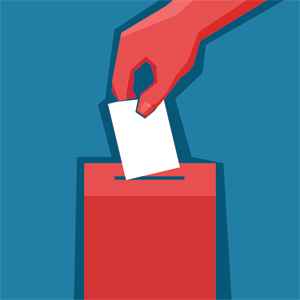Another 'shadow docket' decision? SCOTUS once again blocks relaxed election procedures

Image from Shutterstock.com.
The U.S. Supreme Court on Tuesday stayed an injunction that would have made it easier to place a measure on the ballot seeking to reform Oregon’s redistricting process.
The brief order is consistent with other recent orders by the court that blocked attempts to ease election procedures during the COVID-19 pandemic, report the New York Times, the Washington Post and SCOTUSblog. Justices Ruth Bader Ginsburg and Sonia Sotomayor would have denied the stay.
According to the New York Times, the theme running through the recent decisions “is an impatience with federal judges who make changes to state election procedures, especially when the election is looming.”
The order comes as some commentators have raised questions about the Supreme Court’s “shadow docket” in which the court issues orders, often without explanation in response to an emergency petition. “With two months to go, it seems likely that the shadow docket will produce more 5–4 splits than the merits docket—for the first time, well, ever,” wrote Steve Vladeck, a professor at the University of Texas School of Law, for Slate.
U.S. District Judge Michael McShane of Eugene, Oregon, had cited the coronavirus pandemic in his July 13 order on the ballot measure to amend the state constitution. McShane told election officials that they should either reduce the number of signatures needed to get the redistricting measure on the ballot, or they should extend the deadline for gathering signatures. The 9th U.S. Circuit Court of Appeals at San Francisco refused to issue a stay.
The measure would have placed redistricting decisions in the hands of an independent commission, rather than Oregon’s Democratic-controlled legislature. The case is Clarno v. People Not Politicians Oregon.
Also on Tuesday, Justice Elena Kagan refused to stay a federal appeals court ruling that held that colleges can’t limit education-related compensation for football and basketball players.
Thomson Reuters Legal and SCOTUSblog have coverage.
William Baude, a professor at the University of Chicago Law School, coined the term “shadow docket” and defined it as “a range of orders and summary decisions that defy [the Supreme Court’s] normal procedural regularity.” Several recent orders were issued by the Supreme Court on Friday evenings, “after at least some of the Supreme Court press corps are already a couple of beers into their weekends,” according to a Vox op-ed.
The Trump administration is bringing more emergency requests to the Supreme Court, and it has a high win rate in shadow docket cases. The Trump administration has submitted 34 applications for emergency relief in its first three and a half years in office, compared to 16 combined in the Bush and Obama administrations, according to Slate. The Trump administration won 22 of its requests, in whole or in part, including 10 wins this year.
Shadow docket decisions have been divided. At least 10 orders responding to emergency requests in the court’s most recent term have been decided by 5-4 votes, according to Vox. Eight were decided with Republican-appointed justices in the majority.
“Unlike cases on the court’s regular docket, shadow docket cases receive very limited briefings and are rarely, if ever, argued before the justices. Though the justices will often discuss these cases among themselves, they frequently do so on an extraordinarily compressed schedule—leaving far less time for reasoned debate,” according to Vox.
Some lower courts are beginning to cite the orders as precedent, even though justices have said they lack precedential value. And the orders are affecting millions of lives, according to Vladeck’s Slate article.
The orders have allowed the resumption of federal executions, allowed President Donald Trump to use military funds for a border wall, blocked an order requiring a sheriff to better protect inmates from COVID-19, and allowed implementation of COVID-19 restrictions.
“In their impact, the justices’ rulings to date reveal three problematic trends,” Vladeck wrote. “Republican federal and state government parties fare far better than their Democratic counterparts; the impact these orders have upon the public has disappeared from the legal analysis; and the justices are even more sharply partisan in these cases than in those that receive more attention.”



